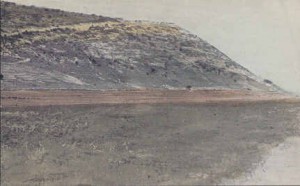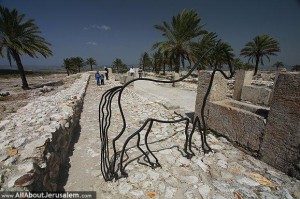It is a D’var Torah that was given on the occasion of the yahrtzeit of my father, z”l, and of the fathers of two other members of our shul. It was written to be a speech, not an article. The sources are paraphrased as needed. It is not strictly related to the Haftarah.
Shabbat Shalom. This D’var Torah is dedicated to the memory of my father, Peter Rozenberg, Pinchas ben Natan Nota, the memory of Shaul’s Galek’s father, Chaim ben Shaul and Zelda, and the memory of Ziva Feigenbaum’s father, Dov Ber ben Zorach Yaakov.
I’ll start with a truly depressing verse from Kohelet:
כִּי הַחַיִּים יוֹדְעִים שֶׁיָּמֻתוּ וְהַמֵּתִים אֵינָם יוֹדְעִים מְאוּמָה וְאֵין עוֹד לָהֶם שָׂכָר כִּי נִשְׁכַּח זִכְרָם:
“For the living know that they will die, the dead know nothing, and there is no reward for them, for their memory has been forgotten” (Kohelet 9:5)
There is a Midrash in Kohelet Rabbah (9) on this verse:
R’ Chiya and R’ Yonatan were at a funeral. R’ Chiya saw that R’ Yonatan had his tzitzis out, and told him to cover them as it is rude to the denizens of the cemetery, it hurts their feelings. (In fact, that is the Halacha, not to wear tzitzis out in a cemetery). R’ Yonatan said to him, “Rebbe, but doesn’t it say, ‘the dead know nothing?” R’ Chiya answered, “You might know Mikra, text, but you don’t know Midrash! (and apparently, Kohelet must be studied with Midrash…) ‘For the living know that they will die: those are the righteous, that even in their death are called ‘living’; ‘the dead know nothing’: those are the evildoers, that even in their lives are called ‘dead’. How do we know that the righteous are called living, even in their death? As it says, in Parshat Ki Tisa – at that difficult time after the Sin of the Golden Calf, but before G-d actually forgave them:
G-d said to Moshe, “Go, go up from here, you and the people that I brought up from Egypt, to the land about which I swore to Avraham, Yitzchak, and Yaakov, to tell them, to their descendants I will give it.” (Shemot 33:1)
G-d said to Moshe regarding the promise, “to tell them”, as if he is supposed to go now to the Avot and tell them that G-d is now fulfilling the promise. As if they’re still alive and he could talk to them. From this, R’ Chiya derives that tzaddikim, the righteous, are considered living even when they’re dead.
But in what sense are the considered living? In reality, they are dead, they are gone. Moshe cannot actually go talk to the Avot…
Another Midrash: (Taanit 5b)
R’ Yochanan said: “Yaakov Avinu is not dead.”. They said to him, “What do you mean, not dead? They had a funeral, they eulogized him, they buried him?!” He said, “I derive this from the Mikra, the text, from a verse in Yirmeyahu that says: “Do not fear, Yaakov … I will rescue you from afar and your descendants from captivity” (Yirmiyahu 30) – it identifies his descendants with him: just as the descendants are living, so too, he is living.”
We have already determined what “living” is: the righteous are called living even in their death. “His descendants are living” equals “his descendants are righteous”, that is, his descendants follow his ways, and continue in his path.
So Avraham Avinu is not dead, because each one of his descendants that does Chessed and welcomes people into their home continues the path of Avraham Avinu; thus Avraham Avinu is not dead.
Yitzchak Avinu is not dead, because each one of us that plants something here in the Land of Israel continues the path of Yitzchak Avinu.
Yaakov Avinu is not dead because each one of us that has a dream and a destiny, and is willing to struggle to achieve it, continues the path of Yaakov Avinu. Thus, Yaakov Avinu is not dead.
As long as his descendants are living, he, too is living.
In Parshat Ki Tisa, when Moshe is told about the Sin of the Golden Calf, and G-d says to him, “Leave Me alone, and I will wipe them out”, Moshe tries to convince G-d not to destroy the Jewish People. He says: “Remember what You promised to Avraham, to Yitzchak, and to Yaakov, Your servants, that You swore to them” (Shemot 32:13).
Now, this argument, that if G-d destroys the Jewish People, He will not be able to fulfill His promise, what kind of argument is it? What information does it add? G-d couldn’t think of this on His own? He was like, “Oh, yeah, right, I promised…” ?!
What G-d meant was as follows: If the Jewish People do not continue in the path of the Avot, then they are not living, they are dead. And like it says in Kohelet, “the dead know nothing”. The promise does not apply to them. It is over. To this, Moshe argues, “No, that is not so!”
The Midrash (Shemot Rabbah 44) on this verse compares Israel to a grapevine. In the winter, the grapevine looks utterly dead. Dry pieces of wood, with no signs of life. But then the spring comes, and the grapevine begins to bud and to blossom with new branches. They draw their strength from what had appeared dead but was actually the source of life.
Moshe Rabbeinu said to G-d: “It is true, at this moment everything looks dead and lost. But the strength of the Avot is found within us – they are not dead, they are living! That is, unless G-d destroys the Jewish People, in which case there really will not be any continuation for Avraham, Yitzchak, and Yaakov, and then the promise is indeed void. But as long as the Jewish People exist, there is hope!” And G-d accepted his argument …
As long as there are descendants who continue the path of their fathers, they are not dead, they are called, “living”.
Shabbat Shalom.
Copyright © Kira Sirote
In memory of my father, Peter Rozenberg, z”l
לעילוי נשמת אבי מורי פנחס בן נתן נטע ז”ל


